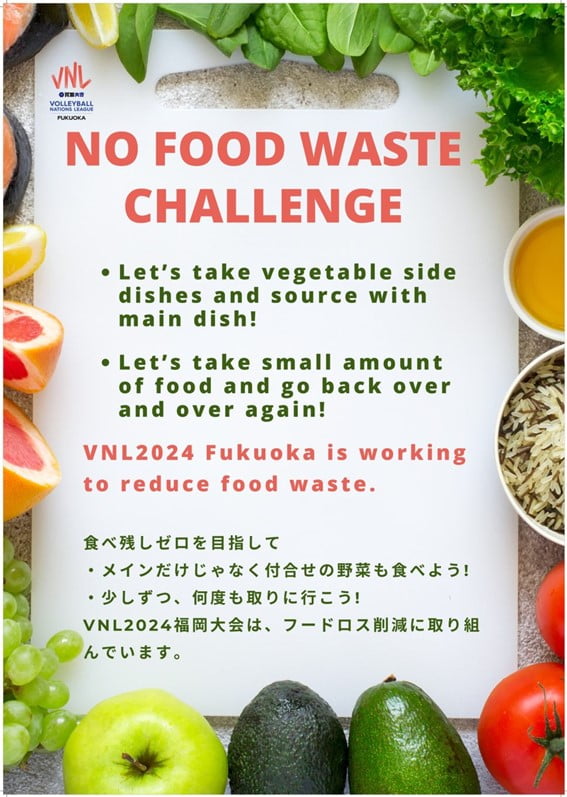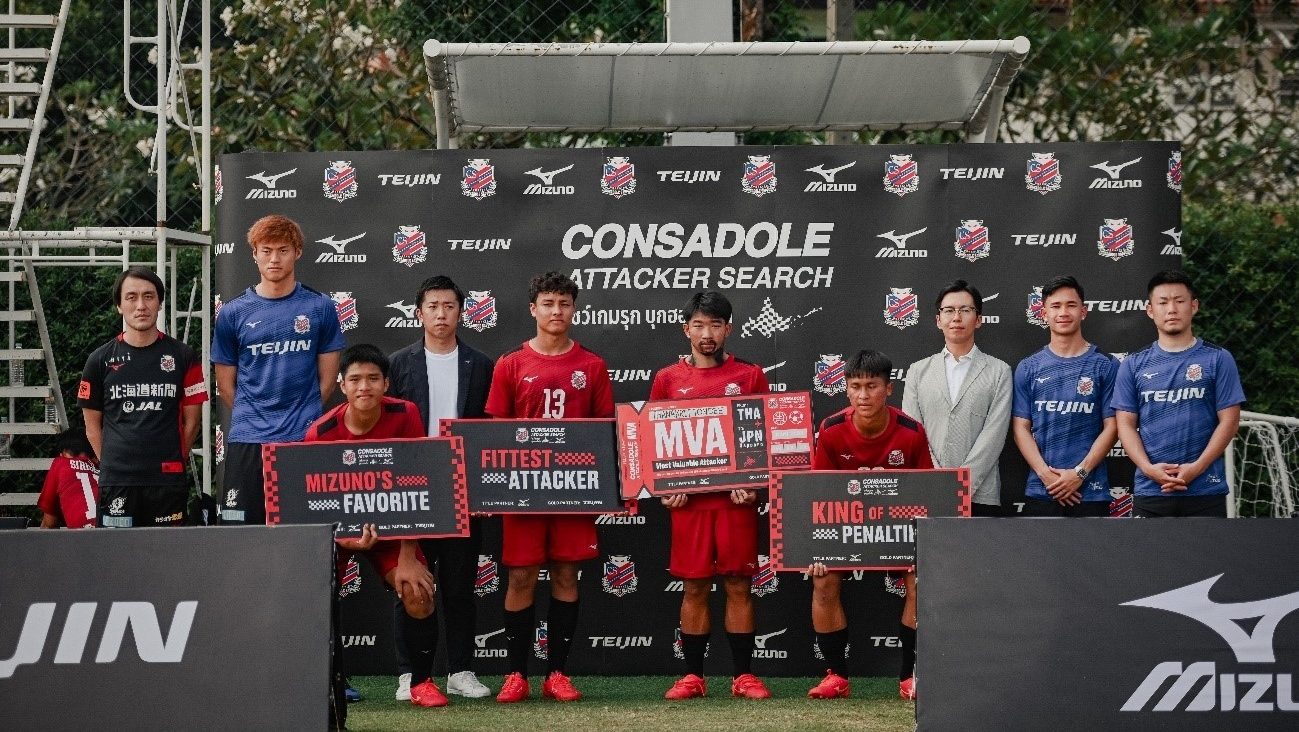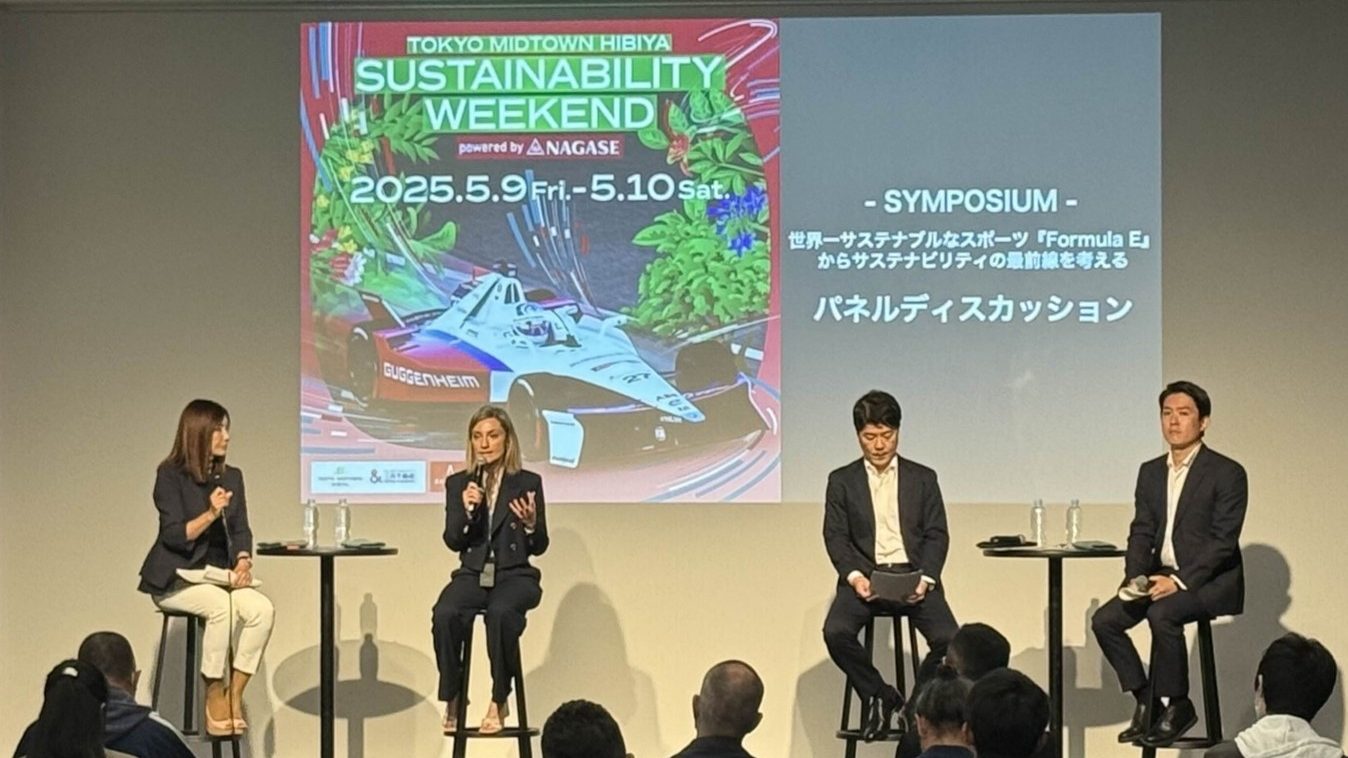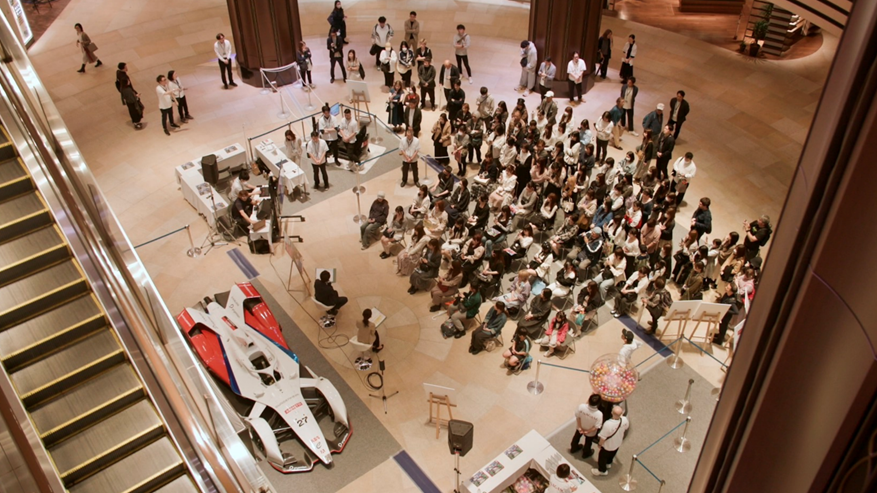
The “Kaitori Daikichi Volleyball Nations League 2024 Fukuoka Tournament” (hereafter referred to as VNL2024 Fukuoka), which generated an economic ripple effect of over 3.6 billion yen and publicity exceeding 30.2 billion yen (domestically) for Fukuoka Prefecture and Kitakyushu City, was carried out with specific initiatives for the realisation of the SDGs and for the benefit of children who will shape the future. In this part 2, the author will introduce the specific outcomes of these efforts.
New Initiatives at the VNL2024 Fukuoka
The VNL2024 Fukuoka introduced unprecedented initiatives to create a new vision of what international sporting events could bring. Several of examples of what was carried out are introduced below.
1. Reduction of Food Waste: Introduction of Meal Tickets
In the case of large-scale international sports events, many staff members and volunteers, in addition to the athletes, are involved in the backstage to deliver an event successfully. At the VNL2024 Fukuoka, meals were provided for approximately 2,000 athletes and staff, amounting to over 20,000 meals in total (an equivalent of nearly 55 years’ worth of lunches, if it were for one person).
In past large-scale international sports events, it was a customary to provide catering at hotels for athletes and boxed meal bentos for staff from a convenience standpoint. With good intentions to ensure satisfaction, excessive purchasing and leftover food resulted in large food waste, squandering resources and increasing waste.
With one of the important purposes of hosting such large-scale international events being for the benefit of children who will shape the future, our responsibility towards reducing unnecessary waste was an essential point.
Recognizing that one of the core purposes of hosting such international events is to create a better future for the next generation, we felt a strong responsibility to reduce food waste and use resources wisely. This sense of responsibility became even more urgent when we considered the global reality of hunger and poverty.
According to the United Nations, approximately one in nine people worldwide are suffering from hunger, and one in four children are suffering from hunger. And though not widely known, according to OECD data, Japan's relative child poverty rate stands at approximately 13.9% (as of 2020), one of the highest levels among developed countries. This means that nearly one in seven children are forced to live on less than half of the median income, and in terms of population, approximately 2.35 million children in Japan are living in environments where they cannot eat enough.
With such realities though not well known, we – as the VNL 2024 Fukuoka Organising Committee - received the full support of our partners and suppliers in trying to find solutions. Various measures were implemented, but as one of the examples, the hotel that needs to offer dishes tailored to the eating habits of the various national teams with nutritional elements as a priority, made efforts to served smaller portions of freshly prepared meals timed to the arrival of teams, and served based on past data and experience. With this, the hotels managed to minimize leftover food through ingenuity and by promoting reduction of food waste actively to the athletes through posters and pop-ups. This attempt became possible through the cooperation of the local hotel as provider and athlete delegations as consumers, where the athletes openly and whole heartedly cooperated in the efforts of food waste reduction.

Additionally, though it had been customary to provide boxed meal bentos to officials and staff during tournaments, this time, meal tickets available to be used at nearby restaurants were distributed in place of that. This was an attempt to reduce food waste caused by excess supply, and as a result, there were zero discarded bento meals, and leftovers were significantly reduced. It was a very innovative approach which allowed not only for reduction of food waste, but encouragement of the tournament related personnel to make their way into the city, which added to the atmosphere of the whole city welcoming the event (vs where the event concludes itself in a small sphere limited to the venue). Such meal provision by tickets owes much to the full cooperation of Kitakyushu City who called for the cooperation of various eateries and eventually were made available for use at over 100 eateries around the venue adjacent to Kokura Station. Looking back as improvement of the future, we should have communicated the significance of this initiative in a more explicit way to the busy staff members to thank them for cooperating in using the food tickets despite their limitations in time.
In addition to the eateries, thanks to the support of dozens of food trucks of the region summoned to the park next to the venue, the staff were conveniently able to choose their favorite menu of their choice on site, instead of a given lunch box, resulting in highly satisfied staff with the hot meal. This was truly a new initiative realised through a partnership with the local community.

2. Collection and Recycling of Stick Balloons
VNL2024 Fukuoka also tackled reducing waste to lessen the environmental burdens. In total 37 tons of plastic waste was recycled in this event alone. One of the biggest challenges was the tens and thousands of stick balloons made of thin plastic, which are essential for cheering at volleyball matches, but disposable and voluminous in itself. In usual circumstances, spectators often discarded them in nearby convenience store trash bins or station garbage cans after leaving the match venue, however this causes a nuisance to the local community who can no longer use the trash bin due to it being filled with stick balloons. Having waste bins overflowing with stick balloons that have the event name largely printed, sometimes having them flying in the streets and ending up in the sea is not the image we as organisers would like to propagate through sporting events. In order to bring as much awareness to the meaning of the initiative and to call on the cooperation of the spectators, we enlisted the cooperation of YAMAMOTO Tomohiro, Japan Men’s National Team player, to send a message on social media saying, "Please help us make the tournament clean," before the tournament began.

And we also placed stick balloon collection boxes at all exits during the tournament. By asking for the audience's understanding and cooperation in ensuring the stick balloons were collected, making announcements before and after the games, staff members calling out at the exits, the collection boxes at the venue were full of stick balloons, and most were successfully collected resulting in praise from the local community that thanked the staff for taking care of matters to such meticulous level.

Once the stick balloons were collected, in terms of waste management, we as the organizing committee chose an environmentally considerate method to dispose of the collected balloons. We outsourced the disposal to the Hiroshima plant of KIYOU Corporation, which possesses cutting-edge waste treatment technology and is committed to realising a sustainable, circular society. The plant is known within Japan for having made a breakthrough by using an advanced system of high-temperature, high-pressure hydrolysis instead of incineration, which reduced carbon dioxide emissions significantly. The residue was also reduced greatly and will further be recycled into materials such as cement bulking agents, making it an innovative treatment process.
3. Initiatives for the Children Who Will Shape the Future
Fukuoka Prefecture also made sure to make the most of this event which brings together the world’s top volleyball players to increase children's interest in sports and improve their athletic ability by allowing them to watch the top athletes play up close and interact with the athletes. Over 1,600 elementary school students from twenty-five schools in the prefecture were invited to watch the tournament. Players from professional volleyball teams based in Fukuoka Prefecture and former Japan Women’s National Team players also visited junior high and high schools to hold special classes in physical education lessons and club activity time before the tournament to enrich even more the singular opportunity to see the world’s top players.

Another aspect to allow for higher participation and interest amongst the younger future generation was the implementation of a wide range 'child rate'. In our ticket sales as the VNL 2024 Fukuoka Organising Committee, instead of cutting off the child rate at elementary school children, we extended it to include middle and high school students. This pricing was a consideration for local junior and senior high school students to witness world-class play at a price that they could actually afford, and it was widely accepted as a good example of our positive attitude toward the next generation of children which should be adopted for future events as well.
The implementation of these initiatives in line with the SDGs' principle of pursuing health for all people, including the next generation, were realised through the efforts of the tournament organising committee and the local government of Fukuoka Prefecture, where each contributed in the area they could do, which reminded us of the importance of “Partnerships for the Goals” of SDGs.
Reflecting back, though not originally intended, by the hosts and organising committee placing importance and calling for support towards the SDGs, the VNL itself became an occasion for players and other stakeholders to contribute by bringing the resources they originally possessed and advance various initiatives without the need of additional heavily financial investment. I would proudly say that this new style is one of the important achievements of this tournament.
4. For “Integration of the City, Players, and Fans”
Another highly praised initiative that contributed to value of having the event for the community was the ability to allow anyone to become part of the event. This was made possible through the introduction of a "Fan Zone" where fans and by even passers could have a moment with players that had finished their match. This was a first in Japan. Additionally, to reduce the environmental impact of team bus travel, the athletes stayed at a hotel just a two-minute walk from the match venue, where the players walked on their own from the venue to the hotel.
As a result, local residents and fans from all over the country were able to see and at times even interact with international players they usually would only be able to see on TV. (Some players were over two meters tall, and those who saw them in person were overwhelmed by their presence.) The fan zone, being able to take photos together and shake hands, became a groundbreaking initiative that symbolized integration with the local community. A new light and positive image of what volleyball could bring to a city was widely covered by media. It is also to be noted that we, as organisers of VNL 2024 Fukuoka, saw a very positive effect on game attendance; matches between teams other than the host country have often had many empty seats in Japan and other countries. However, at this Fukuoka tournament, even matches between foreign teams were nearly sold out, and it is regarded that this is the result of the players from the various countries being very generous with the local community and fans, taking pictures together, giving signatures, even sharing their favorite food so far in the city.


A Tournament That Will Influence Other Sports Events
This event, enabled through the partnership and cooperation between FIVB/VW, CB, Ltd, and Fukuoka Prefecture, received high acclaim in that it realised a truly feasible model that integrated wholly large-scale international sports events and the SDGs advocated by the United Nations. It also contributed to an ongoing understanding and awareness of “Sports x SDGs,” as companies, local governments, communities, schools, families, and each participant in the tournament have become SDG leaders in line with the idea of Goal #17 in the SDGs, “Partnerships for the Goals.”
The VNL2024 Fukuoka attracted unprecedented media attention, part due to the competition as the Paris Olympics qualification, but also due to the appeal as an event that was welcomed wholly by the city, its focus on SDGs, and various measures to "integrate of the city, players, and fans." Not only did the local media in Fukuoka Prefecture increase their reporting, but so did the Japan’s national media, ultimately achieving a publicity effect valued at approximately 30.25 billion yen (according to Nihon Monitor). The number of spectators recorded at 84,520 people, the highest ever for a VNL event in Japan, and the economic ripple effect in Kitakyushu City and Fukuoka Prefecture reached 3.608 billion yen (announced by Kitakyushu City, researched by the University of Kitakyushu), making the event a great success in all aspects.
Such partnership between the international sports federation and the local government to host events was innovative. It explored various attempts to be aligned to the SDGs goals while also contributed to the sport and its growth as a whole. Encounters with world-class players in the host community increased the number of local volleyball fans and, by extension, the volleyball population in Japan. It also leaded promoting regional revitalisation. We believe that such collaboration will serve as a model for international sports events in the future. An ideal state of a sports event should be where everyone involved in to think seriously about the SDGs and children’s future, and to act to achieve their goals accordingly. This is the true legacy that we should pass on to the future.

◇AOYAMA Aria
Volleyball World Strategic Partner, Japan (CB, Ltd); Chief Operating Officer of CB, Ltd
After working for an international consulting firm in Israel, she served as an international public relations advisor for government agencies. She joined CB, Ltd as an executive in 2017. As an expert in cultural diplomacy, she continues to promote the allure of Japan and acts as a bridge between Japanese and international cultural figures, diplomats, and sports federations, aiming to achieve a peaceful and stable international society. She also serves as the Representative Director of the Japan Institute of Culture & International Exchange, Director of the Japan Para climbing Association, Director of the X Games Japan Executive Committee, and the Vice Chairperson of the VNL2024 Fukuoka Tournament Organising Committee.
*The affiliation and titles were as of October 2024, when the column was written.
Note: This article was originally published in Japanese on Nov 21, 2024. The original article can be accessed here.







